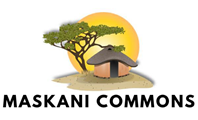Becoming a Maskani Digital Peacebuilder
Before I share my story, I wanted to introduce you to the Maskani Commons. In March of 2020, with the support of the Knowledge Platform Security & Rule of Law’s (KPSRL) Knowledge Management Fund (KMF), the Center for Media, Democracy, Peace and Security — Rongo University (CMDPS-RU) and Build Up, the Maskani Digital Peace Process was born. Dr. Fredrick Ogenga, the director of CMDPS, was able to draw in the participation of students and faculty advisors from six public universities in Western Kenya to establish the Maskani Team. The six public universities involved in Maskani are Rongo University, Maseno University, JOOUST, MMUST, KIBU and Kisii University.

Maskani is a Swahili word for dwelling that is open and welcoming for dialogue, a fitting symbol for the team.
By May 2020, the Maskani Commons had grown to 60 students across the six universities and was ready to take off. Build Up drew from its digital peacebuilding work in the USA (The Commons) and collaborated with Dr. Ogenga and other faculty members to develop an intensive 4-week digital peacebuilding training schedule for the students. This was followed by 2 months of online peacebuilding practicums allowing each students to put their training to work.
It is because of the creation of the Maskani Commons and the support of all the students and faculty that helped to create it, that I can share my own personal reflection on what it means to me to be a digital peacebuilder in Kenya.
Maskani through My Eyes
My name is Sheila Akinyi Owino, I am in my second year at Jaramogi Oginga Odinga University of Science and Technology (JOOUST). I am undertaking my undergraduate course in Bachelor of Education with IT.

Growing up in modern times where technology advancement is characterised by numerous social media platforms, communication has become easier and faster through these platforms. As a student, I have always used these platforms for fun and for social interactions with my friends. For instance, before I joined the Maskani digital peacebuilding initiative, my Facebook account was always full of my pictures, funny memes and motivational quotes while my inbox was just for normal chats with my friends and family members. I never tried using Twitter before because believed that it was for celebrities and influential people in Kenya and around the world. I never had any keen interest in any of the Facebook or Twitter posts that we’re focused on the current issues in my country because my interest in social media platforms was purely for fun. I was careful not to attach my deeper beliefs and concerns to my posts on any social media platforms.
Covid 19 Strikes
When Covid 19 pandemic struck Kenya in early March of this year, I was in the University and after some few days, we were released to go home . It was a moment filled with fears, panic and anxiety because we didn’t know what would follow. There were lots of false information going around and I was so paranoid that I stayed indoors every day.
Filled with boredom , I was always on my phone and social media which did put me into great risks of cyber-bulling and I was spending lots of my pocket money on data bundles while doing nothing constructive online.
On one particular day, my literature lecturer called me and explained to me more about Maskani and that my University have been given the opportunity to work with other universities towards digital peacebuilding. I was so enthusiastic, especially given much of my focus was on the risks of the pandemic.
That marked my first journey as a digital peacebuilder. I worked with faculty to create the JOOUST Maskani group and identified students from JOOUST to join. We made sure they hailed from different ethnic groups and there was gender balance given the importance of representation for the team.
Training in Digital Peacebuilding
Our first session was very interactive and it was an eye opener for me as I was able to understand the opinions of other students which I was never keen to consider. The session was a general topic which touched on the problems we faced in our University and the greatest challenge touched on Kenyan politics and ethnicity /inter- tribal wrangles and the current issue at hand which was Covid 19 pandemic. The Kenyan politics have always brought instability in our country because it’s always characterised by mass killings and destruction of property. Ethnic divides have always resulted in inter-tribal wars and disunity.
I interacted with students from different ethnic backgrounds who were from our University and learned about their cultures and lifestyle and it was through Maskani that I was able to interact deeply because in the University that interaction is very minimal.
I am from the Luo ethnic community and I interacted with students from Kalenjin, Masaai, Kamba, Kissi & Luhya ethnic communities in a new and unique way. This forced me to step out of my comfort zone and begin to learn about the diversity and appreciate other students from different ethnic backgrounds.
Another technology that I learnt from Maskani was holding our conference meeting through Zoom because we couldn’t have physical meeting. Build Up taught me how to use Zoom which I later explained to my fellow students. Build Up hosted our first Zoom meeting which was very successful and interactive.
Strengthening my Peacebuilding Muscles
Our first step to digital peacebuilding made me very anxious and somewhat paranoid. It was a period of transition. A period of using social media for concrete reasons, a reason for change in the country. A reason for peace! Peace! Peace!
I wanted peace to prevail in our country. Maskani allowed me to use my social media platforms differently from the normal funny posts for the post of a noble cause.My sense of reasoning changed, and I noticed the negativity in social media not as a given but as a problem that needed to be confronted.
The inter-tribal insults, harsh political posts, which have always increased the political tension in the country, became very glaring to me. The Maskani team geared us towards the depolarization of harsh and disrespectful rhetoric. This gave me both a sigh of relief and courage to deepen my involvement and embrace my role as a digital peacebuilder.
I started working on depolarizing the most polarized online posts. My first journey towards depolarization was not as successful as I hoped. My post received no response and I was so much disheartened. But I consulted my fellow students, faculty advisors and Build Up and learned to be patient. I learned that I should engage with as many posts across different platforms and with different users to increase my chances of getting responses. As Build Up explained in the training and support that followed, I was strengthening my peacebuilding muscles.

Last month, towards the end of our sprints, my fellow students and I graduated with practicum certificates of Maskani digital peacebuilding. I was very happy to graduate with two certificates from the Maskani process during the pandemic.
I am grateful for Maskani for keeping me fully engaged amid the fears and confusions in the world. We became a family as we were always there for each other.
Maskani also shaped my leadership skills as I was always on the frontline for my fellow student from my University. I always encouraged my fellow students not to give up however much challenges they were facing with the training and the practicum work we were doing. I am happy to declare that my team performed very well and were both motivated by and motivating to the other universities. JOOUST had eight students graduate from both the training and the practicum, leading the way in the larger Maskani team.
Excited about the Future
The main reason I am so enthusiastic about working with Maskani is that I want to be an agent of peace and a champion in my country. After getting so involved with Maskani, I am so obsessed with peace in ways that positively add to my life. I want to become a role model to my fellow ladies who aspire to become leaders in countries like Kenya where women are still disregarded. I want to be a voice of those little girls from disadvantaged backgrounds and communities who are self-motivated for breaking all the bondages of self- doubts, low self-esteem and who dream to pursue this noble course of peace.
As we say in Maskani, Nguvu Pamoja, which means Strong Together! If you look for the hashtag, #NguvuPamoja, you might even find me there.
